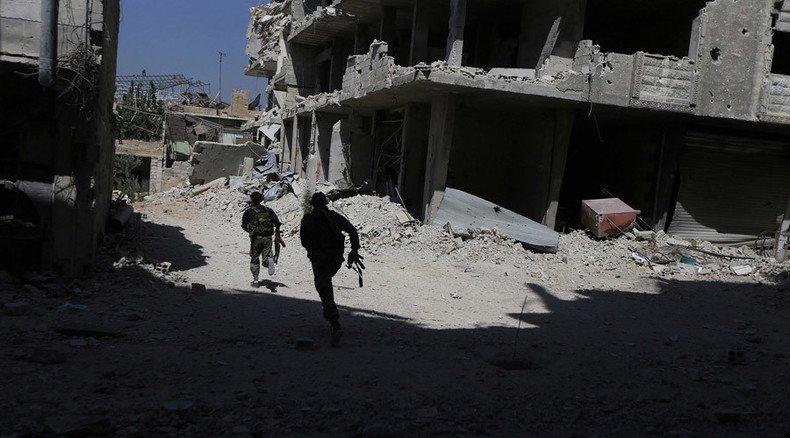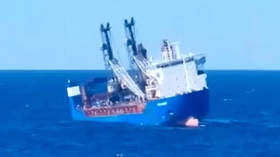OPCW finds chemical weapons use during rebels vs ISIS fighting in Syria – Reuters

A new report reveals that mustard gas was used during fighting between Islamic State (IS, previously ISIS/ISIL) and other militant groups in a Syrian town, Reuters has reported, citing an undisclosed paper by the international chemical arms watchdog.
READ MORE: US begins training ‘moderate rebels’ on Syrian territory – report
The Organization for the Prohibition of Chemical Weapons (OPCW) released a confidential report on October 29, revealing the latest use of chemical weapons in Syria.
The summary of the report seen by Reuters concluded “with the utmost confidence that at least two people were exposed to sulfur mustard [on August 21]” in the town of Marea, located north of Aleppo.
“It is very likely that the effects of sulfur mustard resulted in the death of a baby,” the report added.
Notably, it is unclear which militant group used the mustard gas, as the OPCW is not tasked with identifying who used the chemical weapon.
Sulfur mustard is known to lead to severe delayed burns to the eyes, skin and lungs.
‘ISIS used chemical weapons in Iraq in August’: Kurds cite blood tests
http://t.co/S1IgI50ooupic.twitter.com/cdIrzySr5Y
— RT America (@RT_America) October 7, 2015The news agency also quotes diplomatic sources as confirming the use of chemical weapons during the fighting between Islamic State and a rebel group in the town of Marea at the time.
“It raises the major question of where the sulfur mustard came from,” a source stated. “Either they gained the ability to make it themselves, or it may have come from an undeclared stockpile overtaken by IS. Both are worrying options.”
Syria surrendered its chemical weapons stockpile 18 months ago, which would have included sulfur mustard. It also officially became an OPCW member in October 2013. The move followed atrocities involving chemical weapons, such as an attack in Ghouta in August of 2013, which Damascus and anti-Assad rebels blamed on each other.
In August, Syria’s envoy to the UN categorically denied claims that the country had used chemical weapons. “The Syrian government has not used and will never use chemical weapons,” said Bashar Jaafari, who is the Syrian Ambassador to the UN. He also added that the Syrian army had been attacked by chemical weapons.
State Department spokesman John Kirby told Reuters that the OPCW shared three reports with member states on October 29.
He stressed that “two of these reports are very disturbing. The OPCW has confirmed [chemical weapons] use in one investigation, and concluded likely use in a second.”
The spokesman also revealed that OPCW had discovered the use of toxic chemicals, which likely contained chlorine, in opposition-controlled territory in Syria’s Idlib Province.
UN Secretary General Ban Ki-moon will get a chance to review all three reports later this month, according to Kirby. “If it is determined that a non-state actor such as ISIL was also using chemical weapons, such use would be consistent with ISIL’s record of complete disregard for human rights and international norms and values,” he said.
Rebels conduct new chemical weapons attack in Syria near Turkish border - report http://t.co/bnDu7mbxCz
— RT (@RT_com) October 30, 2013There were also reports that Islamic State fighters used mortar rounds containing a mustard agent against Kurdish peshmerga fighters in northern Iraq back in August, according to Kurdish authorities.
The Russian Foreign Ministry’s spokesperson, Maria Zakharova, warned in September that Islamic State had obtained the scientific documentation necessary to produce chemical weapons.
“In particular, there’s information about ISIS getting scientific and technical documentation for production of chemical weapons, capture of chemical plants, recruitment of foreign experts for activities aiming to set up synthesis of chemical warfare agents,” Zakharova told a media briefing.
The spokesperson added that there was a possibility that these chemical agents could be spread outside of the territory controlled by ISIS and even beyond the Middle East.












